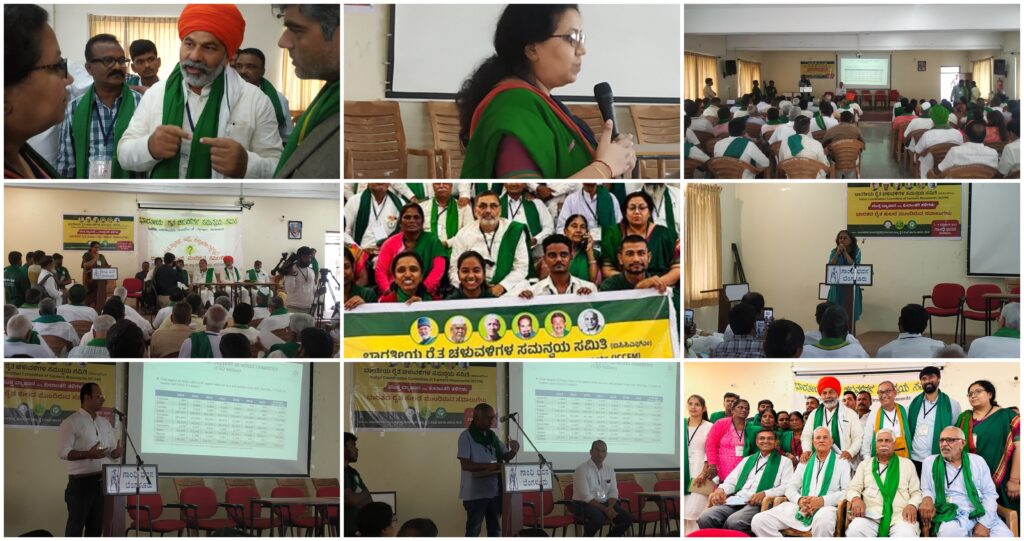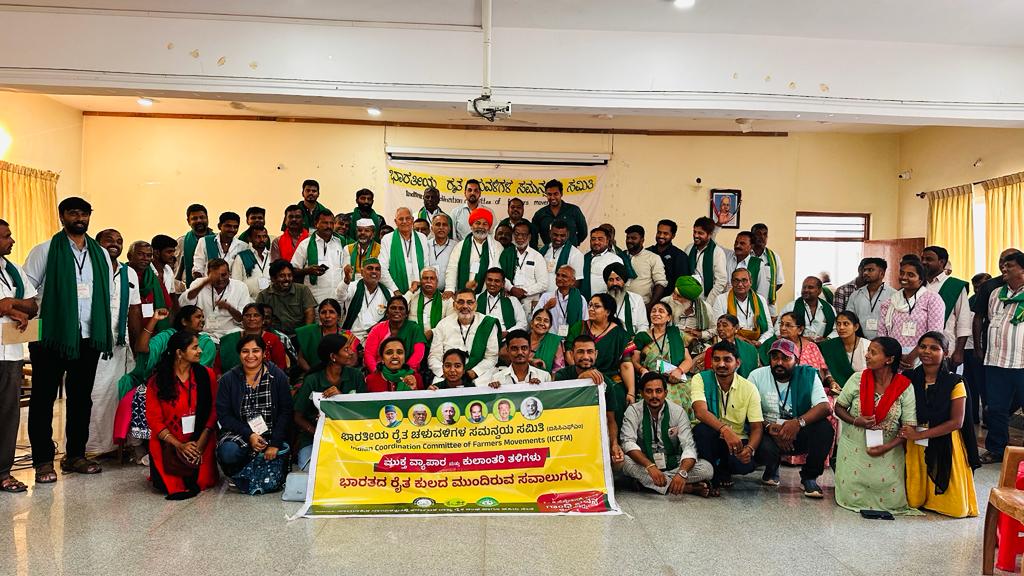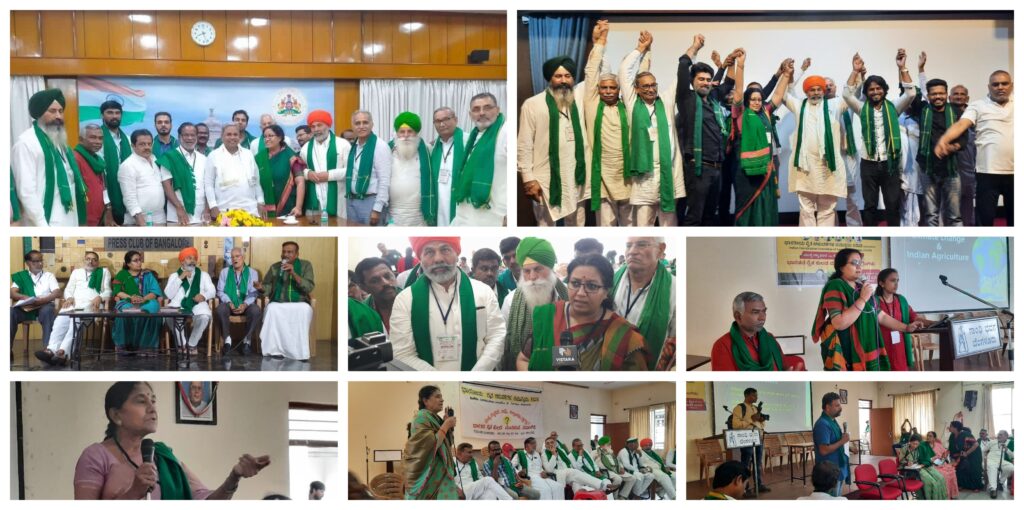The Indian Coordination Committee of Farmers’ Movement (ICCFM) held a three-day forum in Bengaluru from the 7th to the 9th of September 2023. Farmers from Kerala, Karnataka, Tamil Nadu, Uttar Pradesh, Madhya Pradesh, Uttarakhand, Haryana, and Punjab, affiliated with ICCFM’s member organizations such as the Bhartiya Kisan Union (BKU), Karnataka Rajya Raitha Sangha (KRRS), Tamilaga Vivasayigal Sangam (TVS), and others, attended the forum. Among other topics, they analyzed the ongoing trade negotiations in which India is engaged and assessed the impact of the climate crisis on Indian agriculture.
The participants were of the opinion that a fair remunerative price is central to finding a solution to the ongoing farm crisis in the country. The rise in input prices, excessive reliance on chemical inputs, and extreme weather events leading to crop loss have rendered farming unviable for a significant majority of India’s small-scale farmers. The situation has only worsened over the years.

Speaking at the event, Rakesh Tikait of BKU, one of the prominent leaders who led the historic farmers’ protests in 2021, emphasized the urgent need to legislate the Minimum Support Price (MSP) as a legal guarantee to prevent farmers from incurring substantial losses. He also highlighted the need to develop food and agricultural policies that facilitate a transition to agroecological farming and multi-crop farming to restore soil health and reduce the burden of rising input costs on farmers.
The participants also delved into the various bilateral trade negotiations India is currently involved in, including those with the EU. A significant demand from EU negotiators has been the liberalization of the agricultural and dairy sectors. Trade analysts who addressed the gathering pointed out that this demand persists despite the fact that the EU imposes much higher tariffs on India’s exports (with an average of 39.2%), in contrast to India’s average tariff of 11.7% on EU products. Additionally, there are non-tariff measures that the EU enforces on India, primarily pertaining to quality control and health and hygiene standards, which are tailored to benefit the industry but prove challenging for India’s small-scale farmers and dairy producers to meet.

India boasts nearly 8 million dairy farmers, and any reduction in duties on products like skimmed milk powder and whole milk powder would only hinder the growth of India’s small-scale dairy processing industries.
Forum participants cautioned against any attempts to lower tariffs, as such actions would exacerbate the crisis. The majority of Indian farmers and other food producers are smallholders who cannot compete with the influx of inexpensive imports from highly subsidized transnational agribusinesses in wealthier countries. They also assessed the impact of the World Trade Organization’s policies, which have created numerous barriers to implementing a fair system of remunerative prices in India.
So far, India has been hesitant to open up its agricultural sector, which accounts for 40.2% of employment (according to 2019 data).
“For nearly 30 years now, the WTO has obstructed efforts to improve the MSP for farmers. Due to the highly unfair trade rules established by this institution, Indian small-scale farmers have never received a fair price for their produce. Consequently, rural India is now grappling with a debt crisis that has claimed the lives of more than 350,000 farmers in 30 years. The new-age trade agreements being pushed bilaterally between India and other countries appear to replicate the highly problematic policies of the WTO, such as low tariffs, incentivizing large-scale monoculture farms, and promoting the use of chemical inputs. Some of these agreements, whether bilateral or multilateral, are also paving the way for the deregulation of some of India’s policies related to GM Food, farmers’ seeds, and more. Despite India’s agriculture being predominantly small-scale, most policies are designed to facilitate the corporatization of the agricultural sector. The protests that farmers undertook in 2021 were against these attempts, and we need to remain vigilant regarding any efforts in these areas,” warned Yudhvir Singh of BKU.

There are also reports that EU negotiators are pushing for India to join UPOV 1991, the International Union for the Protection of New Varieties of Plants, a controversial treaty that has been accused of favoring the interests of seed companies more than farmers.
Farmers from Uttarakhand also raised concerns about the severe crop losses they suffered due to persistent flooding over the last few months. Those from the Southern States, where agriculture is highly dependent on the rains, lamented the weak monsoons and the impending drought. For the past four years, Karnataka has mostly grappled with floods during the rainy season. However, this year, with the southwest monsoon behaving unpredictably, the state faces a grim drought that threatens to devastate the kharif crop. Many farmers who spoke at the event shared testimonies of the losses incurred on their standing crops. Karnataka has the highest proportion of drought-prone land among major states, with about 79 per cent of its arable land being susceptible to drought. Over the last two decades, the state has witnessed 11 drought-affected and four flood-affected years.
The participants also conducted a session on the issue of GMOs. In late 2022, the Indian Government had given an oral undertaking in the Supreme Court, stating that it would not proceed with the commercial cultivation of GM Mustard. However, in 2023, they sought to withdraw this oral undertaking and requested permission to sow GM seeds at some sites. Farmers and experts who spoke at the event addressed issues such as yields, herbicide tolerance of GM mustard, biosafety, and other concerns. They also alleged that the Dhara Mustard Hybrid (DMH-11), also known as GM mustard, developed by Delhi University, is in reality patented by a subsidiary of the multinational giant Bayer and is herbicide-tolerant, raising health concerns for consumers.
“Seed sovereignty is central to food sovereignty. With the advent of terminator seeds, male sterility, and new technologies like gene-editing, farmers’ sovereignty over seeds is under threat. When we have no control over the seeds, what are we truly accomplishing here? The policies stemming from the green revolution have already led us to excessive dependency on chemical inputs, the repercussions of which are now evident in our soil, as well as the rising costs. Losing our seed sovereignty will further enable someone else to control what we produce and how we produce it,” cautioned Chukki Nanjudaswamy of KRRS.
A small delegation also met with the state’s Chief Minister to seek his support in developing public policies that support the state’s food and seed sovereignty. On the evening of 8 September, the farmers also attended a special screening of the newly released Kannada film Kshetrapati, which highlights the lives and struggles of India’s farmers.
The event at Gandhi Bhavan in Bengaluru took place under three layers of police security, as Rakesh Tikait had received several threats to his life due to his role in the farmers’ protest of 2021. In response to this, Chukki Najundaswamy added, “The fact that we can only discuss the factors affecting our lives and livelihoods under such stringent police security reveals the state of affairs in the country. Why should we be fearful of discussing our plight? Imagine this is the Gandhi Bhavan, and yet we are forced to take cover. It is essential to reflect on the circumstances that are forcing farmers to seek security to voice their demands.”
The event, originally planned for New Delhi, was relocated to Bengaluru because the national capital was under severe restrictions due to the recently concluded G20 event.
On the 9th of September, the ICCFM members who attended the forum also met with members of the fisherfolk movements and other rural social movements that are part of the International Planning Committee on Food Sovereignty (IPC) to initiate preparations for a Global Farmers’ forum on Food Sovereignty scheduled to take place in India in 2025.
